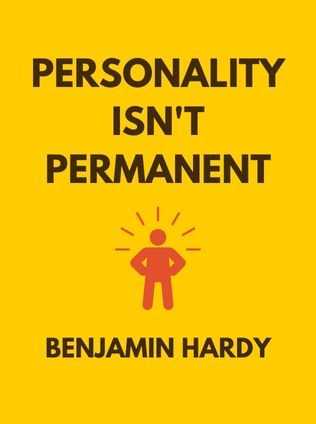
Personality Isn't Permanent
Break Free from Self-Limiting Beliefs and Rewrite Your Story
By Benjamin Hardy
Published 06/2020
About the Author
Benjamin Hardy is an organizational psychologist, entrepreneur, and best-selling author known for his work on personal development and entrepreneurship. Hardy holds a PhD in Industrial and Organizational Psychology and has a passion for helping individuals achieve their goals and reach their full potential. He is recognized for his ability to distill complex psychological concepts into actionable strategies that anyone can use to improve their lives. Hardy's writings have been featured in numerous publications, and he has built a large following through his popular blog and books, including Willpower Doesn’t Work and Personality Isn’t Permanent. In his work, Hardy challenges conventional wisdom about personality, arguing that it is not a fixed trait but something that can be intentionally shaped and changed.
Main Idea
Personality Isn’t Permanent by Benjamin Hardy challenges the traditional belief that personality is fixed and unchangeable. Instead, Hardy argues that personality is fluid and can be shaped by our choices, behaviors, and environment. The book provides practical strategies for intentionally changing your personality to align with your goals and aspirations. Hardy encourages readers to embrace the possibility of change, overcome limiting beliefs, and take control of their personal growth journey. By focusing on who you want to become and making deliberate choices, you can transform your personality and achieve a more fulfilling life.
Table of Contents
- Clearing Up Misconceptions About Personality
- Personality Change Starts With Deciding Who You Want to Become
- Take Action Toward Your Primary Goal
- Change Your Narratives to Serve Your Primary Goal
- There Is No Endpoint
Clearing Up Misconceptions About Personality
Hardy begins the book by addressing common misconceptions about personality. He explains that many people believe their personality is a fixed trait, determined by their past experiences and genetic makeup. This belief is reinforced by the popularity of personality tests, which categorize individuals into specific types. However, Hardy argues that this view is not supported by science. He points out that personality is not static; rather, it is shaped by our environment, goals, and behaviors. "You are not a product of your past, but of your choices and actions," Hardy asserts, challenging readers to let go of limiting beliefs about their personality.
One of the key misconceptions Hardy addresses is the idea that the past determines your personality. Many people fall into the "end of history illusion," believing that their current self is the final version of who they are. However, Hardy explains that this is not the case. Our personality is constantly evolving, and we have the power to shape it through intentional actions. Another misconception is that our current self represents our true, authentic self. Hardy argues that this belief limits our potential for growth, as it discourages us from making changes that could lead to a more fulfilling life.
Hardy argues that the idea of a fixed personality limits what you can achieve in life. When you believe that your personality is unchangeable, you restrict yourself to choices that fit within your current comfort zone. This mindset leads to self-limiting behaviors and missed opportunities. Instead, Hardy encourages readers to view their personality as adaptable, shaped by their decisions and actions. By embracing the potential for change, you open yourself up to new possibilities and experiences that can lead to greater fulfillment.
Sign up for FREE and get access to 1,400+ books summaries.
You May Also Like
The Subtle Art of Not Giving a F*ck
A Counterintuitive Approach to Living a Good Life
By Mark MansonRich Dad Poor Dad
What the Rich Teach Their Kids About Money - That the Poor and Middle Class Do Not!
By Robert T. KiyosakiHow To Win Friends and Influence People
The All-Time Classic Manual Of People Skills
By Dale CarnegieFreakonomics
A Rogue Economist Explores the Hidden Side of Everything
By Steven D. Levitt and Stephen J. Dubner



















